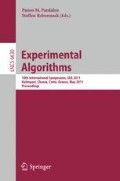Abstract
In cumulative scheduling, conflict analysis seems to be one of the key ingredients to solve such problems efficiently. Thereby, the computational complexity of explanation algorithms plays an important role. Even more when we are faced with a backtracking system where explanations need to be constructed on the fly.
In this paper we present extensive computational results to analyze the impact of explanation algorithms for the cumulative constraint in a backward checking system. The considered explanation algorithms differ in their quality and computational complexity. We present results for the domain propagation algorithms time-tabling, edge-finding, and energetic reasoning.
Supported by the DFG Research Center Matheon Mathematics for key technologies in Berlin.
Access this chapter
Tax calculation will be finalised at checkout
Purchases are for personal use only
Preview
Unable to display preview. Download preview PDF.
References
Achterberg, T.: Conflict analysis in mixed integer programming. Discrete Optimization 4(1), 4–20 (2007); special issue: Mixed Integer Programming
Achterberg, T.: SCIP: Solving Constraint Integer Programs. Math. Programming Computation 1(1), 1–41 (2009)
Aggoun, A., Beldiceanu, N.: Extending chip in order to solve complex scheduling and placement problems. Mathematical and Computer Modelling 17(7), 57–73 (1993)
Artigues, C., Demassey, S., Neron, E.: Resource-Constrained Project Scheduling: Models, Algorithms, Extensions and Applications. ISTE (2007)
Baptiste, P., Le Pape, C., Nuijten, W.: Constraint-based scheduling: applying constraint programming to scheduling problems. In: International Series in Operations Research & Management Science, vol. 39. Kluwer Academic Publishers, Boston (2001)
Baptiste, P., Pape, C.L.: Constraint propagation and decomposition techniques for highly disjunctive and highly cumulative project scheduling problems. Constraints 5(1/2), 119–139 (2000)
Berthold, T., Heinz, S., Lübbecke, M.E., Möhring, R.H., Schulz, J.: A constraint integer programming approach for resource-constrained project scheduling. In: Lodi, A., Milano, M., Toth, P. (eds.) CPAIOR 2010. LNCS, vol. 6140, pp. 313–317. Springer, Heidelberg (2010)
Hartmann, S., Briskorn, D.: A survey of variants and extensions of the resource-constrained project scheduling problem. Eur. J. Oper. Res. 207(1), 1–14 (2009)
Klein, R., Scholl, A.: Computing lower bounds by destructive improvement: An application to resource-constrained project scheduling. European Journal of Operational Research 112(2), 322–346 (1999)
Marques-Silva, J.P., Sakallah, K.A.: Grasp: A search algorithm for propositional satisfiability. IEEE Transactions on Computers 48, 506–521 (1999)
Möhring, R.H., Schulz, A.S., Stork, F., Uetz, M.: Solving project scheduling problems by minimum cut computations. Manage. Sci. 49(3), 330–350 (2003)
PSPLib: Project Scheduling Problem LIBrary, http://129.187.106.231/psplib/ (last accessed 2011)
Schutt, A., Feydy, T., Stuckey, P., Wallace, M.: Explaining the cumulative propagator. Constraints, 1–33 (2010)
Vilím, P.: Max energy filtering algorithm for discrete cumulative resources. In: van Hoeve, W.-J., Hooker, J.N. (eds.) CPAIOR 2009. LNCS, vol. 5547, pp. 294–308. Springer, Heidelberg (2009)
Author information
Authors and Affiliations
Editor information
Editors and Affiliations
Rights and permissions
Copyright information
© 2011 Springer-Verlag Berlin Heidelberg
About this paper
Cite this paper
Heinz, S., Schulz, J. (2011). Explanations for the Cumulative Constraint: An Experimental Study. In: Pardalos, P.M., Rebennack, S. (eds) Experimental Algorithms. SEA 2011. Lecture Notes in Computer Science, vol 6630. Springer, Berlin, Heidelberg. https://doi.org/10.1007/978-3-642-20662-7_34
Download citation
DOI: https://doi.org/10.1007/978-3-642-20662-7_34
Publisher Name: Springer, Berlin, Heidelberg
Print ISBN: 978-3-642-20661-0
Online ISBN: 978-3-642-20662-7
eBook Packages: Computer ScienceComputer Science (R0)

